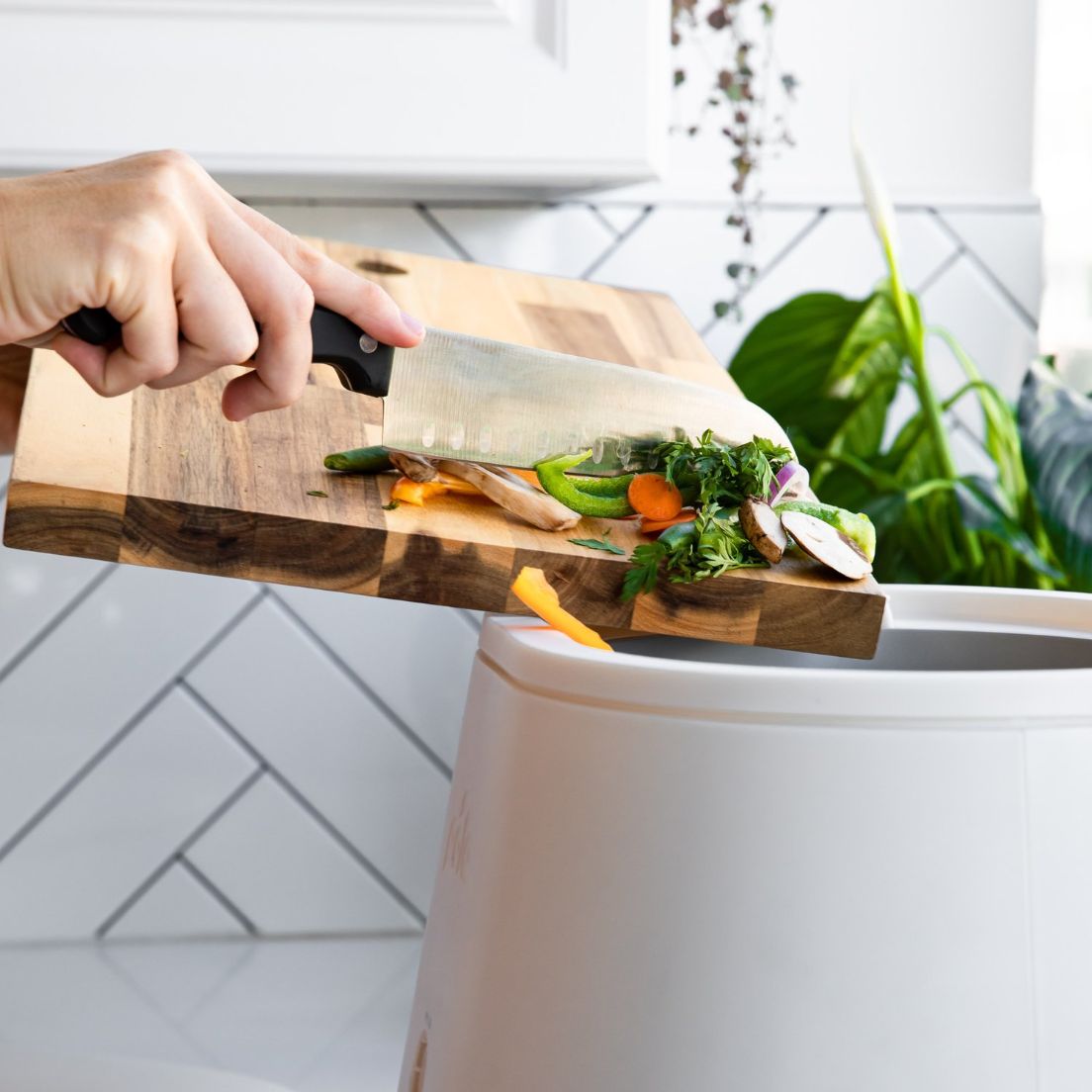
There are several ways to add nutrients to your soil. Two of the most popular soil additives out there are compost and fertilizer, namely chemical fertilizer. They’re used for similar purposes, but is compost the same as fertilizer? Though both additives can contribute essential nutrients to your soil, they’re actually quite different.
If you’re unsure about which is better for your garden or are wondering if fertilizer is bad for the environment, we’re here to help. We’ll discuss which is better compost or fertilizer by covering these important topics and questions:
Table of contents
Before we expand on the differences and similarities of compost and chemical fertilizer, let’s first explain what these additives actually are.
What is compost?

Compost is a soil amendment made up of a mixture of plant and food waste. Once these organic materials undergo the decomposition process, the mixture is ready to be added to gardens, lawns, and potted plants. Compost contains lots of nutrients, enriches soil, and can suppress plant diseases.
If you’ve never made your own compost, you can check out our helpful composting for beginners guide. You’ll see that there are many composting methods to choose from, including a few for those living in apartment buildings. It’s important to note that compost and the act of composting are ideal for those wanting to live sustainably. Composting allows you to safely dispose of your organic waste while creating something new to nourish your soil and plants.
What is fertilizer?

Fertilizer is technically any material added to soil or plants to supply nutrients. This material could be of natural or synthetic origin, as there are both chemical and organic fertilizers. Chemical fertilizers all contain some mixture of nitrogen, potassium, and phosphorus, which are essential nutrients for plants.
Chemical fertilizers are usually made from petroleum products. This can lead to issues like soil degradation and nitrogen leaching. This is why many prefer natural options when comparing organic fertilizers vs chemical fertilizers. Given the explanation above, you may be wondering, is compost a fertilizer? To the extent that it’s a material that adds nutrients to soil and plants, yes, compost is an organic fertilizer. That’s why the major differences lie between compost and chemical fertilizer.
Compost vs fertilizer: what are the similarities and differences?
You can achieve healthy plants with both compost and fertilizer, but that doesn’t mean they’re interchangeable. So, what is the difference between compost and fertilizer? Here’s a breakdown of their pros and cons to demonstrate what they have in common and where they deviate.
|
Compost |
Fertilizer |
|
|
Pros |
|
|
|
Cons |
|
|
As you can see, the major similarity between the two is that they add nutrients to the soil. They then deviate in several ways. Composting is better for the environment but requires more effort to make than just buying a bag of fertilizer. Fertilizer is easy to use, but it’s made of synthetic chemicals that can cause pollution and issues with your soil.

Top 6 benefits of using compost over chemical fertilizer

The benefits of composting are impressive, even when compared to the convenience of synthetic fertilizers. Whether you opt for a basic compost pile or one of the best countertop compost bins on the market, here are a few benefits you can look forward to.
- Improves moisture retention: By reducing soil crusting, compost can improve soil water absorption.
- Suppresses disease: Soil borne pathogens can severely damage your plants. Thankfully, there’s a lot of research demonstrating that compost can control soil borne pathogens.
- Lessens carbon footprint: Depending on the method you choose, composting requires significantly less energy to produce than synthetic fertilizers.
- Betters soil structure: Compost improves soil structure, achieving better aeration and drainage in the process.
- Repurposes waste: Having a compost pile or electric composter allows you to repurpose your organic waste rather than just tossing it away.
- No contamination risk: Assuming you know what to compost and what not to, you won’t have to worry about your compost contaminating the groundwater.
6 FAQs on differences between compost and fertilizer
Still have questions about the differences between these two soil amendments? No problem. Below you’ll find answers to some of the most frequently asked questions about them.
1. Is compost better than fertilizer?

The difference between compost and fertilizer largely comes down to the impact on the environment. If you want to live more sustainably, then compost is probably a better choice for you than synthetic fertilizer. If the environment is not a major concern, you may also be put off by the risk of soil degradation.
2. Can you use compost and fertilizer together?
Yes, you can use compost and soil fertilizers together to nourish your garden plants. Fertilizers can provide some of the nutrients that your compost may lack. That said, you might want to pair your compost with an organic fertilizer rather than a synthetic one. The chemicals in synthetic fertilizer could discourage the microbe activity in your compost.
3. Compost vs fertilizer for lawn: which one is better?

Fertilizer and compost are often added to potting soil and garden beds, but what about lawns? Both options are well suited to lawns. Like fertilizer, compost feeds your soil the nutrients, and micronutrients, it needs to thrive. The key difference is that it’s easy to over-fertilize with synthetic fertilizer, which could damage your lawn.
4. Can compost tea replace fertilizer?
Compost tea is essentially water that compost has previously been steeped in. This liquid is filled with nutrients, microorganisms, and humates that help plants better utilize nutrients in the soil. Compost tea can replace fertilizer, largely thanks to its many microorganisms that create healthier soil, protect against diseases, and aid in plant growth.
5. How are fertilizer and compost made?

Chemical fertilizers are normally made using non-petroleum products. Nitrogen-based fertilizers, for example, are made by mixing nitrogen from the air with hydrogen from natural gas to create ammonia. To create your own fertilizer, like compost, all you’ll really need is organic waste and a device, bin, or compost heap to place it in.
6. Does compost replace fertilizer?
Given that compost functions as an organic fertilizer and soil amendment, it can be used in place of fertilizer. Though the two can be used together, it’s important to consider whether or not the groundwater contamination or soil degradation risks are worth the benefits.
Try Lomi for an unlimited supply of nutrient-rich fertilizer for your plants

If you’d like to have your own unlimited supply of natural fertilizer, look no further than Lomi. This compact, countertop-friendly device is one of the best electric composters there is. It’s silent, odorless, and can transform your organic waste into nutrient rich fertilizer in less than a day. Using heat, abrasion, and oxygen, Lomi quickly breaks your food scraps down into dirt that you can add to your indoor and outdoor plants.
Chemical fertilizers are effective and straightforward, but they can have a very negative impact on the environment. If you want to make more sustainable choices, finding ways to make your own compost is preferable. For those living in apartment buildings, the compact Lomi is a great choice. For those with lots of yard space, you should also research some of the many ways of making compost like compost tumblers, vermicomposting, and more.
Written by: E Sawden
